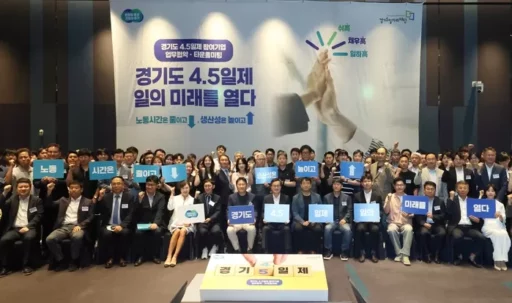Gyeonggi Province Launches Korea's First '4.5-Day Work Week' Pilot Program
Gyeonggi Province is implementing Korea's first '4.5-Day Work Week' pilot program without wage reductions.
On the 19th, at the Ramada Plaza Hotel in Suwon, Governor Kim Dong-yeon and 68 participating companies signed a business agreement, marking the beginning of an experiment with a new working format.

This pilot program is an innovative working method that shortens working hours while maintaining wages, addressing the demands of modern workers seeking work-life balance.
Governor Kim Dong-yeon stated at the signing ceremony, "I believe that implementing the 4.5-day work week will change people's weekly lives," adding, "I am confident that we can achieve both productivity and quality of life."
He further stated, "We will address and improve any issues that arise during the pilot program. We will work with the new government to institutionalize this system."
Flexible Applications of the 4.5-Day Work Week
This pilot program includes a total of 68 companies, with 1,262 workers participating, comprising private companies in Gyeonggi Province and public institutions such as the Gyeonggi Content Agency.

Participating companies can shorten their working hours in various forms according to their situations, including △4.5-day work week (with flexible days), △35-hour work week, and △4-day work week every other week.
Various industries, including IT, manufacturing, and media, are participating, and some companies have already seen positive results.
A manufacturing company in Paju has confirmed health improvements for workers after introducing a 4-day work week every other week, while an IT company in Seongnam, which implemented a 35-hour work week since 2021, plans to further reduce working hours to 30 hours by participating in this pilot program.
Gyeonggi Province's Comprehensive Support and Global Success Stories
Gyeonggi Province and the Gyeonggi Job Foundation provide participating companies with wage compensation incentives of up to 260,000 KRW per worker per month and customized consulting up to 20 million KRW per company, as well as support for establishing attendance management systems.

This year's budget is at 8.3 billion KRW.
Unlike existing flexible working arrangements, this program provides incentives directly to workers rather than companies and analyzes productivity changes in private enterprises.
Officials from the Korea Employers Federation and the Korean Confederation of Trade Unions attended the event, showing great interest.
Bridget Smith, executive member of South Cambridgeshire District in the UK, delivered a congratulatory video message, stating, "We achieved results such as budget savings and reduced turnover rates."
Similar working hour reduction policies are also being successfully implemented in Valencia, Spain, and Iceland, among others.
Gyeonggi Province plans to conduct this pilot program temporarily until 2027 while analyzing 44 detailed indicators, including labor productivity and job satisfaction.

Through this, it aims to derive a social consensus on appropriate working hours and propose institutional improvements to the government.
Meanwhile, President Lee Jae-myung emphasized the need for a 4.5-day work week during his presidential candidacy, including a goal in his final pledge to reduce working hours below the average of the Organization for Economic Co-operation and Development (OECD) by 2030.
Image Source: Gyeonggi Province, AI images for understanding the article / ChatGPT, reference photos for understanding the article / Getty Images Bank


